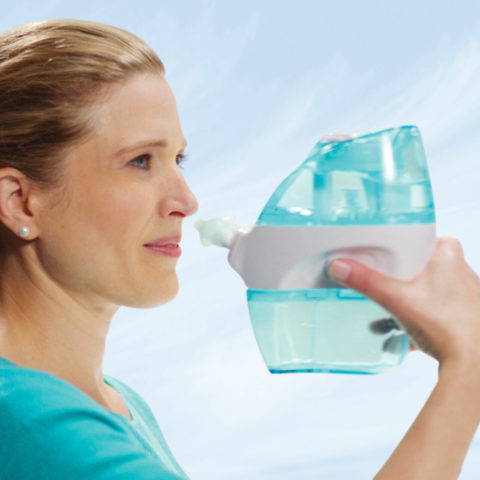
Navage airs its TV commercials with annoying frequency. They say:
Pandemics remind us that germs invade through your nose, the body’s natural air filter for trapping allergens, dirt, and viruses. But how do you clean it? It’s easy with Navage. Navage uses powered suction to flush out all the stuff that causes congestion, allergies, colds, and worse. When your nose is clean, so many good things happen: you breathe better, sleep deeper, snore less, and feel healthier. Join millions who use all-natural, drug-free Navage. You’ll love that clean nose feeling.
This ad raises a lot of questions in my mind
This is all marketing with no science. It seems to imply that Navage can prevent COVID-19, but there is no evidence that it does. The only evidence that “good things” happen is unreliable testimonial evidence from satisfied users. There have been no clinical studies to evaluate the company’s claims. Millions may use it, but the argument from popularity is a logical fallacy. It uses saline pods, but no drugs (unless you consider saline to be a drug). But is it all-natural? I don’t see how a battery-powered device with a motor could be considered “natural.” It may give you a “clean nose feeling,” but that doesn’t mean it is clinically effective.
What is Navage?
The Navage system is a plastic, motorized, battery-powered device with two chambers. The upper chamber is filled with water and a saline pod is inserted and pierced by a device that mixes salt into the water. Two prongs are inserted into the nostrils and as the solution in the upper chamber is pumped into the nose, it rinses out both sides of the nose and is sucked out into the lower chamber, which is transparent so you can see any gunk that was removed.
Many ENT specialists recommend nasal irrigation
There is scientific evidence that nasal irrigation benefits allergies, sinus infections, and colds; but the evidence is not very robust, and it is not recommended for long-term use, which may increase the frequency of infections. When recommended, it is more often used as an adjunct rather than used alone. Hypertonic saline may be more effective but causes more side effects. Nasal steroid sprays are more effective than irrigation. Is Navage safe? They recommend using distilled water. Tap water that hasn’t been boiled and cooled may contain bacteria or amoebas. Several people have died from Naegleria fowleri amoebas in the water supply, but this is rare.
There are other ways to clean the nose, including squeeze bottles and neti pots. I wrote about neti pots before. They are a teapot-like device that originated in India in Ayurvedic tradition; the user inserts the spout into one nostril at a time and bends over the sink; gravity does the work. Which irrigation method works best? We don’t know. The various methods have never been tested against one another. I found testimonials online from patients whose doctors told them to stop using neti pots and switch to Navage, but other patients said their doctors had advised them to stop using Navage and switch to neti pots.
Problems reported
Satisfied users swear that they got wonderful benefits from the Navage system, but using it can be problematic. The website features a number of videos on how to assemble it, on how to use it, and on troubleshooting various problems; apparently users need a lot of help. I found reports from people who had purchased a device that quit working, and then had purchased a second device that also quit working. Some people reported difficulty getting the hang of it; apparently there is a learning curve. Some complained that water kept going down their throat and they felt like they were being waterboarded. Users complained about the cost of the special saltpod capsules (around $20 a month). One described a cumbersome work-around that allowed them to trick the machine into allowing the use of the less expensive saline packets intended for neti pots. The cost of the system is around $100 or more, and many people complained that they wanted to try it but it was too expensive for them. There were reports of perforated eardrums, Eustachian tube dysfunction, and even Bell’s palsy attributed to the device. Many users said it didn’t work for them. Many called it a scam because it requires you to use their special saltpod capsules. They described the process as messy, saying it must be used over a sink. They complained that the ads didn’t divulge that the solution doesn’t get to the frontal sinuses. They said the device leaked. They said it was difficult to clean. And there were many more complaints. One even said “I almost died” (in a mishap that sent concentrated salt up their nose).
Conclusion: Marketing, not science
The Navage website doesn’t even pretend to supply any scientific evidence. The ads are aimed at scientifically naïve people who value testimonials and gadgets, not at those who value science and evidence. There is no reason to think the results of Navage are superior to the results of other methods of nasal irrigation. The nose doesn’t need regular cleaning; that’s a fictitious need that they invented just to sell their product. There is a legitimate concern that using nasal irrigation too often can be harmful. Admittedly, some individuals may have a personal preference for Navage over other methods of nasal irrigation, but I can’t see any compelling reason to recommend it; Neti pots are probably just as effective and far less expensive.

